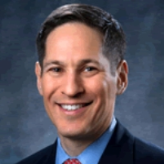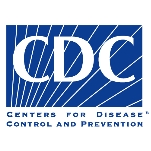Officials
Back to Officials


Offical

Name: Frieden, Tom
Current Position: Previous Director
With a long career in public health, Thomas R. Frieden’s credits include spearheading successful programs to curb tuberculosis in New York City and India. President Barack Obama’s choice to take over the Centers for Disease Control and Prevention (CDC) also has been accused of fomenting a “nanny state” while implementing controversial health measures in the nation’s largest city.
Born December 7, 1960, in Manhattan and raised in Westchester, Frieden graduated from Oberlin College, a liberal arts school in Ohio, in 1982. Before attending medical school at Columbia University, he lived for several months in Stanton, Tennessee, a small, rural area where few residents owned telephones. Frieden spent his time working for the Appalachian Student Health Coalition, gathering information on why locals didn’t utilize a public health clinic more often.
The experience had a profound impact on the impressionable Frieden. While attending Columbia and working on his medical degree, he wrote a letter to the editor in 1984, in which he complained of medical schools placing too much emphasis on specialty training and not enough on primary medicine. He also lamented the prejudice of the medical school system towards poor people, citing one medical school exam that referred to Appalachians as “filthy hillbillies.”
Frieden went on to receive his degrees in medicine and public health from Columbia University. He completed specialty training in internal medicine at Columbia and subspecialty training in infectious diseases at Yale University.
In 1990, Frieden was hired by the CDC as an Epidemic Intelligence Service Officer. In this role he documented a large outbreak of drug-resistant tuberculosis in New York City.
His work impressed NYC officials, who, in 1992, offered Frieden the post of assistant commissioner and director of the Health Department’s Bureau of Tuberculosis Control. The new position allowed him to tackle the TB outbreak head-on, and under his leadership, New York City crafted a model public health program that eventually controlled the epidemic and reduced new cases of drug-resistant tuberculosis by 80%.
By 1996 news of his accomplishments in controlling TB had spread to India, which was struggling with its own outbreak of the disease. As a medical officer for the World Health Organization on loan from the CDC, Frieden assisted in the development of a national tuberculosis prevention program that included building a network of Indian physicians to help state and local governments implement TB treatment and prevention. He also helped the Tuberculosis Research Centre in Chennai, India, establish a program to monitor the impact of tuberculosis control services. Overall, the national program has treated more than eight million patients with tuberculosis.
After five years in India, he returned to New York City at the request of Mayor Michael Bloomberg, who appointed Frieden commissioner of the Department of Health and Mental Hygiene in January 2002. He also took over as chair of the New York City Board of Health.
In becoming NYC’s top health official, Frieden oversaw one of the oldest and largest public health agencies in the country, with an annual budget of $1.7 billion and more than 6,000 staff. His first initiative targeted smoking. He established a system to monitor the city’s smoking rate, and worked with Bloomberg to increase tobacco taxes, ban smoking from workplaces, including restaurants and bars, and run aggressive anti-tobacco advertisements.
Frieden also introduced “Take Care New York,” the city’s first comprehensive health policy, which targeted 10 leading causes of preventable illness and death.
With AIDS a major concern in NYC, Frieden advocated for a controversial plan to eliminate the requirement of patients to sign a written consent before being tested for HIV. Frieden said the change would encourage physicians to offer HIV tests during routine medical care, but some community advocates and civil libertarians opposed the idea because of fears that it would undermine patients’ rights and lead to forced HIV testing.
During Frieden’s watch the health department also introduced the “New York City Condom” program, which now gives away more than 35 million of the prophylactics annually.
To combat cardiovascular disease, Frieden lobbied restaurants to eliminate artificial trans fat, often used in deep frying, from the food they serve—a move labeled as trying to turn the city into a “nanny state,” according to industry representatives. The NYC program inspired similar laws in several cities and the state of California.
Frieden’s health department also required chain restaurants to post calorie information in order to raise consumer awareness. The rule was challenged in court by the New York State Restaurant Association, and even though the requirement was thrown out by a U.S. District Court judge, the NYC Board of Health re-enacted the measure.
During his seven years in New York, Frieden made some enemies who objected to the commissioner’s intrusive policies.
Charles King the president and CEO of Housing Works, a nonprofit organization that provides housing and services to homeless persons living with HIV/AIDS, told New York Magazine, “[Frieden] believes in what he’s doing to the point of arrogance, and as a consequence doesn’t really listen to outside voices.”
President Obama announced Frieden’s appointment to head the CDC on May 15, 2009.
A fiercely private man, Frieden is married with two sons, but has asked the media not to publish their names. His wife reportedly has worked to help battered women, children and immigrants.
300 Million Patients (by Anne Underwood, Newsweek)
Updates on Flu Spotlight New York’s Health Chief (by Anemona Hartocollis, New York Times)
Dr. Do-Gooder (by Dan Halpern, New York Magazine)
The Activist Commissioner (by Brian W. Simpson, Johns Hopkins Public Health Magazine)
Interview with Charlie Rose (August 30, 2006)
Data-Driven Doc (by Jonathan Walters, Governing Magazine)
- Latest News
- D.C. Public Schools will Teach all Second-Graders to Ride a Bike
- New Rule in Germany Limits Sales of Sex-Themed E-Books to 10pm to 6am
- What Happened to the 6-Year-Old Tibetan Boy the Chinese Government Kidnapped 20 Years Ago?
- U.S. Ambassador to Turkey Photoshops his Hair Color to Mock Turkish Mayor
- Mystery Artist Calls Attention to Unfixed Potholes by Drawing Penises around Them





